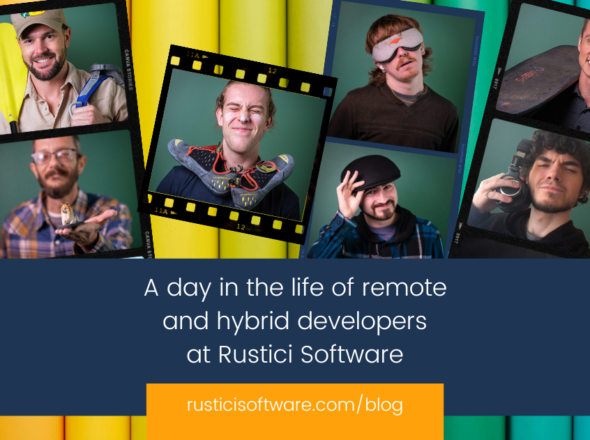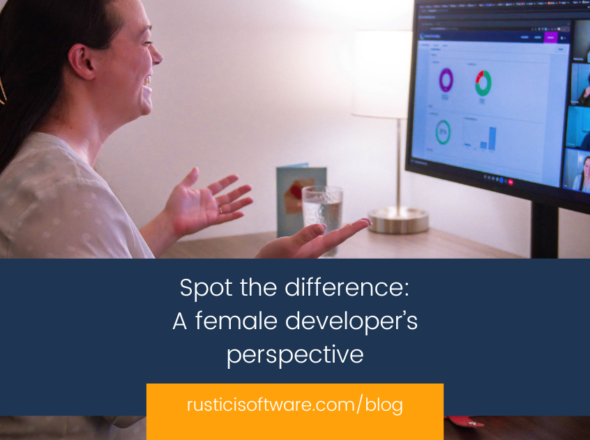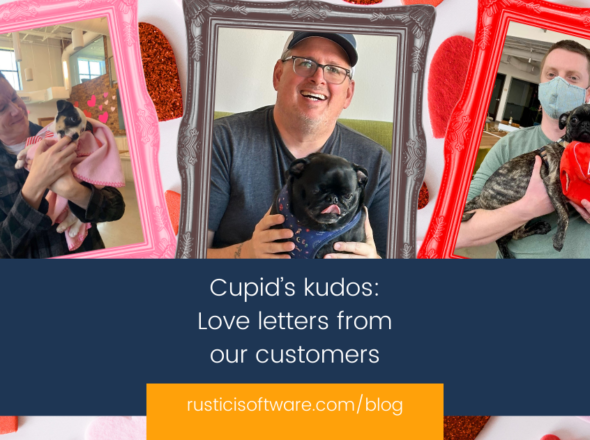We thought it would be fun and interesting to spotlight some Rusticians and present you an interview-style conversation about what it’s like to work at Rustici Software. We started with Joe Donnelly, who is someone that we fondly like to refer to as a Rustici Old Timer. Enjoy!

Hannah: I’ve asked you to chat with me because you’re going on your 9th year here at Rustici Software, and I wanted to get the perspective of someone who has been here for the long haul.
To start, can you tell me how long you’ve been here and a little bit about your role and background?
Joe: I have been with the company going on nine years now – May 15th is my anniversary. I handle first-, second- and third-tier support for all of our clients as well as light project management for our Engine and Content Controller implementations.
H: How would you describe the people that work here?
J: Smart. I think that’s one of the best parts about this job, that there are—I would say that pretty much everyone is smarter than me, and that’s being slightly self-deprecating… I believe that the people that work here are the smartest at the job that we’ve hired them to do. I am consistently learning things. Everyday there is something new.
For some people, like our newer employees, that is hard. You’re never going to know everything. All you have to do is walk down the halls a few times and listen in on some conversations to know that you don’t know everything. You’re probably not going to, and it’s okay.
H: To piggyback off of that…. How would you describe our culture and work environment?
J: I would describe it like this: Because of the way that we work, I am afforded the opportunity to enjoy my life outside of this office a lot more than other jobs I’ve had. Being able to work from home when needed, I have been present for a lot of things that happen outside of the office because of the way that we are allowed to work here. With both of my girls, I’ve been able to be at basketball games, at cheerleading things… I’ve noticed that other dads and moms that work full-time aren’t able to do that. The work/life balance part of our culture is super important and one of the reasons why I came here nine years ago.
H: What were you doing before you came here?
J: I worked for an LMS company as the Customer Support Manager. (Editor’s note: Joe actually came from the same company that both Mike and Tim came from before they started Rustici.) I had a team of support folk that reported to me. Culturally, it was very different. It was ‘if your butt is not in the seat/in your office, you’re not working.’ Maybe you could get away with that 10 years ago, but… People that have a work ethic like most of the people that work here…it seems to be that work happens a lot outside of the office. For me personally, I work really well from home.
H: What has been your most memorable Rustici moment to date?
J: One of the best moments that has happened to me here, and I think it’s really helped the company as a whole, happened while sitting in the office in our old place. Tim, Tammy, maybe TJ and definitely Mike were in the room, and they were asking if I needed help. At the time, and up until like three or four years ago, it was just me working in Support. And I remember Mike saying, “Well, why don’t we just clone you? And then everything will be fine!” Long story short, a couple of months later, Ryan started working here.
H: And Ryan… he’s your brother?
J: Yes. Ryan, Ryan Donnelly, is my brother. (Editor’s note: Joe yelled this at me and said “THAT WAS FOR THE MICROPHONE.” and laughed. Not realizing the microphone was not far away but rather sitting right in front of him. Oh, Joe. Thank you.)
H: So, there were jokes about cloning you and then we hired, kind of, your clone?
J: Yes. So, Ryan came on board. Actually, this was probably a good—an interesting—moment for him. But also a really good moment for me, in that Ryan is 5 years my junior. We have basically been the same person for many years, anyway. He showed up on a Magic event happening on a Sunday afternoon a few years back. He had just moved here from LA, and he showed up and said, “Huh, how many people work here?” as he realized all of these people had come together on a weekend to hang out.
At the time it was 30- or 40-something people, it was right before we split, and there were probably 25 people here on a Sunday to play a game. He ended up having a conversation with Tim, and later me, asking what we did. I told him I needed help and asked him if he wanted to be a part of this place. And that was the seed of when Ryan started working with us.
The most memorable moment for me related to all of this was a moment he had about 6 months in where he felt miserable about what he was doing here. It was that thing of not understanding that it’s baby steps here. Not everyone comes in off the street knowing what SCORM is. I kind of had to talk him down and tell him it was going to be fine, and not a year later and he’d taken over all of Cloud support. I don’t have to do anything with Cloud. So, we effectively brought in another support person who ended up being kind of a clone.
I remember sitting back, going on vacation for a day, and coming back and having no backlog or anything in my inbox and thinking, “This was the right choice. This was 100% the right choice.”
And because of that I get to work with my best friend. Granted, they make us sit in the corner, so nobody can hear us, but that’s fine. We prefer that anyway.
H: Because you guys are so loud and rowdy?
J: We actually do get loud back there, but no one can hear us!
H: Get on my level. (Editor’s note: there’s a chance that the I, Hannah, can be known for my volume in the office.)
J: Yeah, no, we aren’t there yet. Crikey. *laughs* So, that’s a moment.
Another moment, because I’ve been here for so long… I can remember back in our old office, when all of us were there, and I shared an office with someone… it’s always interesting to watch people play pong here, but I specifically remember when John Hayden and Tim would play… it was the thing that stopped everything in the office. There were only about 8-10 of us then. Everyone was sharing an office in those days. So when those two played, everything stopped. We would be in our office windows watching. I think about that a lot. A think about it fondly.
H: What makes you proud to work here?
J: Just the fact that we’re still here. When I started, there were like…8 people? A good portion of those people are still involved, some are upstairs (at our spin-off company, Watershed), but they are still around. We’ve worked hard to do what we aim to do—to make e-learning an easier proposition for a lot of folk where it would usually be super hard.
H: How has Rustici remained true to itself over the years? How has it evolved?
J: From a support perspective, we still answer anything. The ‘Ask me Anything’ thing is still out there. In this day and age, there’s a lot of companies where that just isn’t a thing. You can’t ask any question and expect to get a good answer and I feel like we still do that. That’s a big deal to me.
We’ve got managers now, so that’s evolved a little bit. When I started, it was everybody and Tim and Mike. And even they didn’t refer to themselves as managers. It was truly a flat structure, but as we’ve grown, that’s stopped working. Tim can’t tend to 20-something people’s needs. We’ve needed layers and structure and it seems like they’ve done a good job pulling those people together and maintaining the company’s/Tim’s original management philosophy. It’s not been a negative thing. It was a thing that was needed.
This is a stressful place! Regardless of whether we work from home or have a ping pong table here, it’s still work. And work is hard. And a lot is expected of us. So having those people in place… I can go talk to Tammy and sit in her chair and tell her about my day and the things that are problems in my work life and I trust that she’s going to take care of it and remove any obstacles that in my way.
H: So having a point person and support person makes a big difference and it’s good?
J: Yeah. Yeah.
H: We do a lot of crazy things here. If you had to pick an event that’s been your absolute favorite, what would it be?
J: We do Thanksmas… we have done some really good Thanksmas games. You guys have consistently, over the years, topped what you did the year prior. That’s always fun. I think my favorite one was in an old office where we had to bring in baby photos of ourselves and our parents and we had to walk around and guess who was whom. We’d get points and then there was an auction for gifts… I still think about that one. That was probably the most fun I’ve had in the office in a while. Anytime Riff’s Truck comes to the office I’m happy too.
H: We talk about this concept a lot… what does being excellent or being remarkable mean to you?
J: I talk in my 101s about giving the company your best 40. Your best 40 hours. I would like to think that I try not to—I guess, for me, it’s that I treat our customers as I would want to be treated.
Being excellent is going to really pivot from what your job is. You being excellent is different than me being excellent. But for me, it’s treating people in a manner that I would want to be treated.
When people are finishing an interaction with me, I hope they leave the interaction feeling like they have either learned something or that they are going to move about the world (in the e-learning spectrum or somewhere else) having learned something from us so they can think back and say, ‘Those guys at Rustici, they didn’t have to help me, but they still did. They still wanted to help me.’
That’s a big deal to me.
Around the office, it’s also how we treat our internal customers. We joke about how we take care of bathrooms, which is remnant from the old days when we had one bathroom and the boys and the girls had to use the same restroom. And one of those genders is more gross than the other, and *you guys* really need to figure that out! *Laughs*
So, internally, it’s about positive interactions. We are really good at hiring people that want to help people. Whether it be people here or on the outside. I’ve worked at places where we wouldn’t put developers in front of customers or I wouldn’t bring my wife to meet them. But here, it’s completely different. All of our developers communicate effectively and are really pleasant people.
H: We have all sorts of personalities here, but we don’t have anyone here who isn’t kind or courteous or friendly…
J: Yeah, that’s a good thing. You’re right.
H: You just mentioned this, but are known for welcoming your new hires with your Rustici 101 training. When did this start?
J: It’s been 2-3 years at least… maybe longer. For a while, I didn’t have the framework for what I would say. They would just stick someone in a room with me and I’d start talking. As we got bigger and developed a handbook and things got real, I really started to plan it out.
H: Why did you start doing it?
J: I started doing it because they told me to. It was a responsibility that I was given! I don’t remember who the first person I gave my 101 to is. I’ve done a lot over the years. I really can’t remember!
It was given to me as a task because I’d been around for a while. I like to think that I know how to treat people. I’m also old. I’m allowed to say that! I might be the oldest person in the office. If not,
I’m up there.
I’ve seen some things. I’ve interacted with a lot of people. I like to think that I am good at working at Rustici. I can be independent. If I don’t have something to do, I will find something to do. If I can’t find something to do, I’ll clean the freaking kitchen. I don’t care. That’s what’s important. There’s always something.
H: Would you say that risk taking is encouraged here?
J: Yes. Absolutely. There are no bad mistakes. You definitely are not punished for mistakes here. That’s sometimes a thing. I’m trying to remember a mistake that could have been bad—without incriminating anyone—but yeah, you’re encouraged.
That’s another thing about this company, we have the independence to do what we want. We have managers now, but our managers know that we know what we’re doing. I don’t have to ask permission to make decisions. With that being said, the way my personality is… I will ask permission. I know i don’t have to, but I will. (Editor’s note: can confirm.)
Mistakes, when people fail, they are more teachable moments here. Not just for yourself, but people around you. But there’s never been a situation here where there is finger-wagging or something like that. I’m still struggling to think of a time here where a poor decision was made.
Thanks for your time, Joe!


